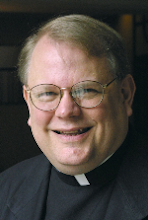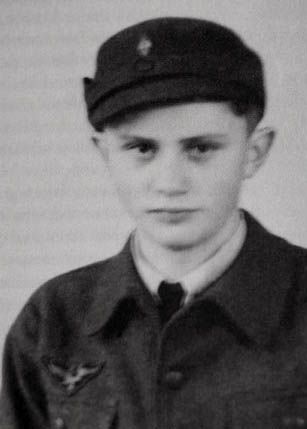
Homily
Thirty-first Sunday in Ordinary Time
What a pathetic figure he is. How they must have laughed at Zacchaeus as he sought to catch a glimpse of the Lord. Didn’t he realize that he was unworthy of the presence of a Messiah?!
First of all, he was littler than everyone else. The kids probably called him shorty in grammar school, and its hard to imagine that any of them chose him to play on their team. And it must have been rather comical to see him jumping up and down behind the crowd on the road to Jericho, trying to see over all the big people as the Lord passed by.
But that didn’t stop him. No, the little guy shimmied up a Sycamore tree to catch a glimpse of Jesus as he passed by.
But how foolish! Didn’t he realize that such a famous rabbi would never associate with a tax collector. The little Zacceaus had, after all, betrayed his own people and his own religion by working for those filthy Romans, who abused the Jews and took the little they had to enrich their coffers. And Zacceaus was a tax collector for these foreigners! Didn’t he realize that the Lord would turn his face from such a sleazy good for nothing?
But that didn’t stop him. No. Nothing stopped him. And that’s why salvation, that’s why Jesus came to his house.
Because Zacchaeus kept his eyes on the prize.
How many times have we seen the fifty-five year old footage of those three hundred peaceful marchers, many of them old people and children, as they attempted to the cross the Edmund Pettus Bridge in peaceful protest of the lynching of a man for the color of his skin. They were met with dogs and tear gas, billy clubs and galloping horses and many were left bloodied and stunned.
Did you ever wonder what kept them going in the face of such violence? One old woman, when asked why she did not turn and run, recalled a sermon by Dr. Martin Luther King a few weeks before when he has urged them to keep their eyes on the prize. For when you keep your eyes on Jesus, he preached, who will lead you to the promised land, nothing can deter you...no tear gas, no violence, no dog’s pointy teeth....not even the roar of their hate can deter you, when you keep your eyes on the prize.
Dr. King was preaching, that day, on Saint Paul’s first letter to the Corinthians (9:24-25) “Do you not know that those who run the race all receive a prize? So run that you might obtain it.” Keep your eyes on the prize.
Like the runner in a marathon, keep your eyes on the prize...on Jesus, your only hope, your only goal, your only God. Keep your eyes on the prize. Not on where you’ve been or what’s around you, not on what somebody’s saying or doing, not on the gossipers and the doomsayers. No. Keep your eyes fixed firmly on Jesus, your hope and your prize. For only then can we win the race.
That’s the lesson of today’s liturgy for each of us who seek to preserve the life of the little baby in its mother’s womb.
- Don’t let the darkness distract you, or the politics gets you down: keep your eyes on the prize...on Jesus.
- Don’t let the temporary triumphs of the Culture of death distract you from the race: keep your eyes on the prize...on Jesus.
- Don’t let sectarian media struggles and idealogical battles frighten you or slow you down: keep your eyes on the prize...on Jesus.
For he is the only way, the only truth, and the source life. He is the light which no darkness can overcome, the truth no lie can destroy, and the life which defeats even death itself!
For, in the end, this is really not our battle our battle. It is the latest chapter in the primordial struggle between light and darkness, goodness and hate, life and death. And each of us, unworthy servants that we are, but play our role.
And the victory of the Gospel of Life, when it comes (and it surely will) will not be ours. It will be his.
The day when our country and our world finally embrace the Gospel of Life, when the lives of the littlest and the weakest are cherished and defended by every person, when the wisdom of the old is cherished as an heirloom and the fragility of the disabled is received as a grace....on that God’s will be the victory and we will give thanks to have a had some small part in helping his Kingdom to come...
And in the meantime, it is ours to pray...without allowing the distractions and discouragements of the world to keep us from falling regularly to our knees...we will pray for life, ever keeping our eyes on the prize, who is Jesus.
- in the meantime, we will march and we will declaim and we will stand for the truth...without allowing the sneers of the world to keep us from this most essential task...we will witness for life, ever keeping our eyes on the prize, who is Jesus.
- in the meantime, we will preach and we will proclaim the inalienable right to life of every human person from conception to natural death....without allowing the name calling and the stares and the harsh comments to deter us.... we will preach for life, ever keeping our eyes on the prize, who is Jesus.
- in the meantime, we will work to make our nation just and promote a government which preserves and cherishes human life in all its stages....without allowing the cold darkness of sin to frighten us away....we will work for life, ever keeping our eyes on the prize, who is Jesus.
We will each do our part, in the public and in the pew, kneeling in our rooms or marching on the street, proudly proclaiming the truth and ever keeping our eyes on Jesus.
For like that short little tax collector, the limitations really don’t matter. All we have to do is keep our eyes on the prize as he passes by. And the one through whom all life was made, will come to our house this day.
Monsignor James P. Moroney
Rector











